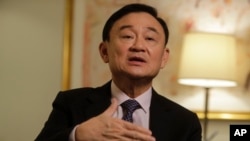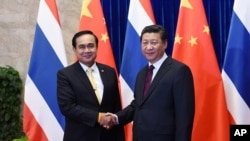Bilateral relations between the United States and Thailand, after what analysts view as a "lost decade," have entered a "new era" following the recent contact by President Donald Trump and Thai Prime Minister Prayut Chan-o-cha.
In his telephone conversation with Prayut, the White House said President Trump highlighted the long standing alliance between the U.S. and Thailand and a "shared interest in strengthening the trade and economic ties between the two countries."
Trump, in a formal invitation to Prayut to visit the White House, also "reaffirmed" the U.S. commitment to an "active and leading role in Asia" in close partnership with the region.
Readjustment in US-Thai relations
The contact marked a major thawing in bilateral ties after Thailand faced diplomatic isolation over the military's intervention in politics over the past decade.
The U.S. administration under President Barack Obama had been critical of Thailand's human rights policies by the military since it took power in May 2014, with the suppression of public debate and bans on political activities.
Thitinan Pongsudhirak, a political scientist at Chulalongkorn University, said Thailand was keen to take up the offer of the U.S. re-establishing links.
Thailand enthusiastic
"The U.S, initiative, overture has been received immediately. And General Prayut – the Prime Minister – has agreed right away to take up the offer of visiting Washington that President Trump has handed. Thailand has been wanting the U.S. to show some accommodation and this has been the kind of gesture they have been looking for," Thitinan said.
Panitan Wattanayagorn, a security advisor to Deputy Prime Minister Prawit Wongsawan, said the renewed high level contact marked a "new era" in bilateral ties.
"Differences and changes in domestic settings and different policies that created friction and tensions between the two countries are now seemingly over. This is a new era built upon old ties but looking forward for better cooperation and challenges in the years ahead," Panitan told VOA.
He said the recent turbulence in bilateral ties had marked a "decade lost" in areas of closer cooperation in security, economics, politics and social contacts.
"This is why the two countries are very serious about picking up the pieces and move on. This is not only to Thailand with many countries in ASEAN, the U.S. is looking to do the same," he said.
Asian initiative not limited to Thailand
President Trump has also invited the Prime Minister of Singapore and the President of the Philippines to make official visits. In addition, Secretary of State Rex Tillerson is hosting ASEAN foreign ministers in Washington Thursday.
Analysts say Thai officials have been working to rebuild diplomatic links with the U.S. soon after the Trump administration took office earlier this year.
Kraisak Choonhavan, a former senator and senior member of the Democrat Party, said a souring in ties with the U.S. dates back to the coup in 2006 and ouster of the government of Prime Minister Thaksin Shinawatra.
But rights groups also accused Thaksin of human rights abuses, including a war on drugs in 2003 that left over 2,500 killed and charges of mishandling security in Thailand's troubled southern border provinces.
Kraisak said during the Thaksin era the U.S. had appeared to set human rights aside in favor of supporting an elected government.
The May 2014 coup that brought Prayut to power was also marked by automatic U.S. cuts in military ties as well as criticism of the military by European and Australian allies. This led Thailand to strengthen links with Russia and China.
The growing ties with China included increased military cooperation, supplanting those traditional links with the U.S.
Growing ties between China, Thailand
Recent military purchases from China include ordering of three Chinese made submarines valued at close $1.0 billion, Chinese made tanks and moves to establish the production of military hardware in Thailand.
Kraisak said given the long history of relations between the U.S. and Thailand, the renewed ties are welcomed.
"It's welcoming for the Thais. I do think it is an impossibility to ignore us, and it be only single minded concentrating on the return of democracy in Thailand is gone now with the new approach from Trump," he said.
But observers says concerns remain about human rights, people trafficking, and other social issues.
Phil Robertson, deputy Asia director for the New York based Human Rights Watch, was critical of Trump's initiatives.
"The really telling point here is that it appears further evidence of Donald Trump's effective abandonment of human rights as a core principle of U.S. foreign policy, contravening a tradition of foreign policy that has been implemented by both conservative and progressive presidents," Robertson said.
Analysts say the renewed bilateral contacts are also seen against the backdrop of offering a counter balance to China's regional influence, especially in Southeast Asia, and galvanizing support in the U.S.'s diplomatic stand-off with North Korea.










